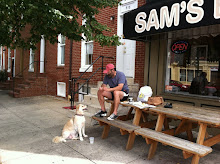Gunpowder Park
Two old men sat by the tree. It was August and they were wearing trench coats. The felt casquette was very becoming to both of them.
I was waiting to see them pull a plastic bag from the bulging coat pocket. A bag full of crumbled stale bread. Rye bread perhaps, which is too dry even when it is fresh. Bread they could not finish last week. Bread for the pigeons they probably knew by name.
They hardly talked. I was on a park bench shaded by an ash tree. I was feeling lazy. My big toe was hurting so I cut my walk short. My foot got caught on a root end a few days ago. I thought my toe was fractured but wanted to wait and see.
I could see the green eyes of the man facing me. It was the sun on his face adding color to his eyes. He looked my way but not at me. I took my shoe off to rub my toe. It was very tender.
And the other man, the one I did not know the color of his eyes, pulled a small bag out of his pocket. It was a leather pouch, a large one. It had a string tied around its neck. Something one sees in movies. And he held it in the palm of his hands, without looking at it.
It was not bread for pigeons, I realized. But he was holding the bag as a magician would hold a white pigeon in his hands after pulling it out of a hat. A pigeon which would fly for a short while before landing on his head. Or his shoulder.
They did not talk. And I was wondering why they were sitting on the ground, near a tree. I felt bad that I had taken the bench from them. I wore my shoe, got up and walked toward them.
“You have to take care of that foot,” the man holding the pouch told me. His eyes were brown, yet they seemed red. He was still holding the pouch in both hands. I could not see a pigeon in it.
“Please use the bench.”
They looked at each other and smiled. It was a capricious smile, one I did not expect from old men wearing trench coats on a balmy August afternoon.
“We used that bench for years.” The blue eyes of the other man were of a color a jeweler would dream of before going to bed. They were not only blue, but of an old blue hidden in the shade the large casquette had shielded them.
“Please, sit with us.”
The three of us sat without talking. Or looking at each other. My toe was not hurting anymore: my heart was racing and I could hear its rate. We were like monks in an urban park. One of us was holding a leather pouch. I was the only one who did not know what was happening.
“We were hoping for a windy day,” finally the man with the leather pouch said. “But I do not think it will pick up.”
It was an oppressingly hot August day near Baltimore. Nothing was moving. The forecast was for passing evening thunder and showers. But evening was hours away.
Then the magician-man gave his pouch to the blue-eyed third monk. Slowly. As if he was giving his liver. Then, after a slight clearing of his throat, he adjusted his collar, pulled slightly on his shirt’s cuffs, and dipped his hand in his coat pocket. I could hear metal.
“Gracie would have loved a bit of wind.”
And he pulled a red dog collar from his pocket. I saw his hand tremble. And slowly, he pulled out perhaps five feet of a thin leather leash attached to the collar by a short metal link chain. Now he looked like a man pulling his entrails out. It seemed as painful as him doing so. Slowly, yet with conviction. It had to come out of his pocket. Even if there was no breeze in the park.
“Fifteen years of love,” the other man said. And holding the pouch close to his chest with his left hand, he turned around and hugged the self-eviscerator. I could see his eyes—they were blue and red. More blue then red.
Then they looked at me, holding each other’s hand, the pouch between their chests, as if birds protecting their chick. And they held hands like lovers would. Not old men. Perhaps like old men who were lovers.
“It is time for Gracie to be in her favorite spot.”
The ashes looked like the ashes one finds near a barbecue stand in the park. It was anti-climactic. It was Gracie.
…. I got up to leave the old men alone. They were hugging and now in tears. I felt the pain in my toe again.
As I was walking away, the blue-eyed man softly bid me a good day.
“I was good that you joined us,” he said. “Gracie loved meeting new people.”
